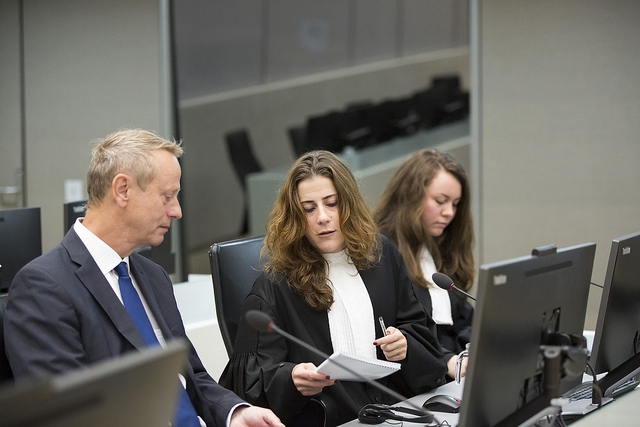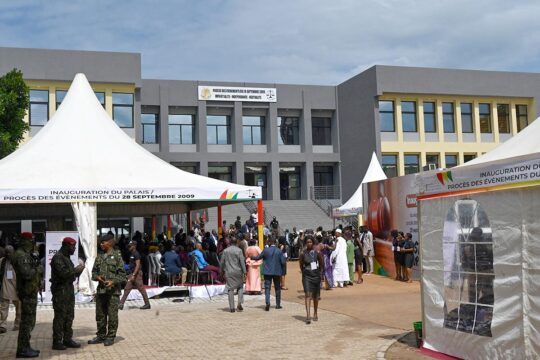In 2012, the International Criminal Court (ICC) handed down its first ever verdict in the trial of Congolese ex-militia leader Thomas Lubanga. Since then, there have been two other confirmed convictions of Congolese Germain Katanga in 2014 and Malian Ahmed Al Mahdi in 2016. However, victims are still waiting for reparations. JusticeInfo talked to Pieter de Baan, Executive Director of the Trust Fund for Victims.
JusticeInfo: Since the opening of the Court in 2002, 16 years ago, reparations have never yet been implemented. How do you explain that?
Pieter de Baan: I can acknowledge the frustration of the victims, the diminishing confidence that they may have. But it is not only about the judicial proceedings, about what the Trust Fund is doing, or how we are finding the money. There is also the problem of security. In this moment, in Ituri province, there is a conflict going on again, targeting the exact same Hema community to which belongs a leading figure who is held liable for reparations. And we may have to readjust our plan. We are continuing to pursue the delivery of the collective awards and the selection of the partners. ICC’s reparations are complex because we are trying to translate from paper into reality something which was never done before. And that is why there have been discussions on how best to manage, respecting the rights of victims and the fact that they should not be re-harmed by the process, what is the way to respect the rights of defense, how far the rights of the defense extend into the reparation stage… So, this is very important for the Judges to think about, and to come up with solutions which are visible, are not too expensive - you do not want to spend more money on the process than on the awards for the victims - , solutions which satisfy victims and also satisfy the States. The success of the reparation mechanism of the Rome Statute is in the interest of all States parties. They need to have confidence that the mechanism they have created is the right one.
You were due to deliver your plan regarding the reparations in Al Mahdi case by February, but you twice asked for a postponement. In a decision last week, the judge said that there is “a pattern” for “routinely” asking for an extension of time. What do you say to that?
I don’t really want to comment on it. But I can say that I understand the frustration of the judges, which is also our own frustration, frankly speaking. There is an enormous amount of work. For reparations, this includes all kind of consultations with the victims, with their lawyers, with donors, States… We are only 15 persons working for the Fund. In a case like Al Mahdi, the drafting of the plan has been significantly impacted by the security situation in Mali and in Timbuktu. We needed to resort to alternative ways to engage with stakeholders, but that really limits the possibility of a meaningful conversation with those who are the most important sources of information. In addition, the arrest and transfer of Al Hassan is a potential game-changer. He is a son of the same town [as Ahmed Al Mahdi], and the crimes for which he has been charged are similar or sometimes overlapping. So, we need to be extremely careful and thoughtful in presenting our plan.
But the Chamber noted that in all the cases, you asked 15 times to postpone the deadline. How are you going to improve the process?
Part of the solution would be to have more staff. The Fund’s regular budget is less than 2% of the Court’s budget [around 2.5 million/year]. We are not spending huge sums of money. But we need to have the ability to respond, which is a need for the Court and for the victims as well. We have proposed to the Court to work with local partners, like we do in the assistance mandate [the Trust Fund has two functions: reparations linked with the conviction of an accused; and assistance, not related to a conviction but to a general situation]. That means we need sufficient staff to manage, to control, and to guide, but we do not need to do everything by ourselves. This is not only efficient in terms of cost, it is also effective, because we can work with partners who have the trust and abilities of local communities that we do not automatically generate here in The Hague. We simply do not have the staff qualified in all the wide range of relevant disciplines, like psychology, education, medical services, protecting building.
But regarding the award in Katanga [in this case, 297 victims had been individually awarded 250 dollars in addition to collective awards for a total of 1 million dollars], the Court has been asking the Fund to be more directly implicated in the implementation of reparations and to be less dependent on using local partners. That in itself is of course a good thing, especially for the victims to have a direct connection to the Trust Fund, but that is putting us in a narrower space in terms of being able to respond to the other reparations deadline that we are facing at the same time. If you want to build something that basically enables the system to respond to the bottom line of the Rome Statute - which I think is justice for Victims - there are not just words, you need to have the ability to deliver.
There is often disappointment when the Court decides to allow collective reparations instead of individual. How do you explain that?
Lots of people understand reparations only in the form of compensation, not just in Ituri [eastern province of the Democratic Republic of Congo, DRC] but in most places in the world. It is my understanding that collective awards are now being accepted by victims. And it underlines the important role of legal representatives who build on the relationship of trust with their clients and explain what the nature of the collective award will be. The trust that victims have in a collective project being implemented by a third party was really low because of the experience they had in the past, with money being distributed in such way that it was not transparent. And they fear that the money will go to other places. That is very much understandable and I think it is indicative of the lack of trust that you would have in any post conflict society, where people have suffered harm, have been marginalized and stigmatized because they have suffered harms and so, they would have very little trust in any institution that on their behalf would implement a collective award. But collective reparation is just another way of organizing the awards.
How do you make beneficiaries understand that this is about justice and not humanitarian aid?
Some of the techniques are the same, but the purpose is different. We make it really clear to the victims that they are receiving reparations because of the link with the convicted crimes. And we make also very clear that the convicted person is financially liable. The Fund may come in, but the liability is still with that person. The reparative value is very clear for the victims. And this has a strong symbolic importance for them. But then, you cannot eat symbolic value you need to offer something concrete. One of the major things we have learnt with the assistance mandate is that psychological harm is always an element of the harm suffered by victims. It is one of the most invisible harms and one of the most stigmatized. Because if you have a mental problem, there is an automatic stigma, you will be kept in the shade. We are making psychological harm, trauma based counseling, and mediation of conflict a central part of our assistance programs. And we are also managing to convince the Court that psychological harm can be presumed. Then, as a victim, you do not have to prove it anymore.
The Court asked Mali and Congo to take their part in the implementation of reparations. What do you think of this decision?
A State party is not responsible for crimes committed by a convicted person, but they have the obligation to cooperate. We are working on a memorandum with the Congolese government. That does not mean they are going to pay for reparations, but that means that they may be helping us to create the conditions for it. I went to Kinshasa and Bamako. In Mali, we did not talk with the Justice ministry only. We had several ministries around the table, including Education, Culture, Solidarity, Health… and it was really useful. Let me give you some examples. For educational support to victims, we have to find a way to do that without disrupting the system. This is very basic, but it is important. If we do vocational training for former child soldiers in the Lubanga reparations, we have to know which agencies already exist, we do not want to re-invent structures. If we talk about delivery of health services, we do not want to build hospital, which is the responsibility of a State. But how can we use hospitals and clinics to receive victims in such way that the integrity of the program is preserved. These are very practical steps. In Bamako, we had a really good conversation, making our counterparts to understand what the reparation awards are. At the same time we have to find a way to implement reparations in such way that we are not dependent on the States. It’s nice and important to have their cooperation, but we do not need to go through their agencies.
A few years ago, there was a decrease in the donations from States parties. How do you explain that?
Many of our donors are from Europe. Those years, they are facing a significant problem of refugees and asylum seekers coming from the conflict in Syria and other parts. What happened is that a lot of the money they would have made available for the Fund and other activities were diverted to take care of these victims inside their own countries. For example, here in The Netherlands, 25% of the development cooperation budget was used to deal with the influx of refugees and asylum seekers. That situation has already diminished and we are seeing more donors coming back, and we are also seeing more donors coming on board. Some of these donors are not giving a lot of money, but they are new donors, with a great symbolic significance. I am talking about countries like Georgia, or Mali, or the Philippines, or Uruguay. It demonstrates that a greater number of States parties attach great importance to the Fund. The symbolic value of that is very important. It does help us to establish the credibility and the validity of the Fund as a mechanism of the Rome Statute.
You have an agreement with Sweden. It agreed to give the Trust Fund around three million dollars within a period of three years. Did you try to have a similar arrangement with others?
We have a similar arrangement with Finland. Other countries may not be able to make that long term financing arrangement, but they are able to commit and say that they will participate every year. Long term commitment is there. States parties are a composite of ministries, of people, and we need to build the bridge with those who have access to budget lines. They need to be convinced. They need to be made to understand that the Trust Fund is associated with the Court, but it has a reparative function that is relevant for post conflict recovery and transitional justice. Then they are able to connect funding of the Trust Fund with their policy priorities in this regard. This also helps to make the court relevant to society, beyond prosecutions, individual victims, beyond what is happening here in the courtrooms.
During his tenure, former Prosecutor Luis Moreno Ocampo, accepted a gift from Qatar. It was a Rolex which was evaluated at around 6,500 Euros and finally given to the Trust Fund. The Trust Fund decided that it wpuld organize an auction. Did you do that?
(Smile) It is still here! It is in a vault. We can still put it into an auction… It is still here and we will do something.
Thomas Lubanga: Convicted for war crimes (14 years)
- Liable for 10 million euros.
- Beneficiaries: Child soldiers
- Collective reparations
Germain Katanga: Convicted for crime against humanity (12 years)
- Liable for 1 million dollars
- Beneficiaries: Bogoro’s population
- Collective and individual reparations
Ahmed Al Mahdi: Convicted for war crimes (9 years)
- Liable for 2.7 million euros
- Beneficiaries: Timbuktu’s population
- Collective and individual reparations






